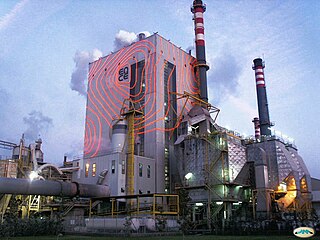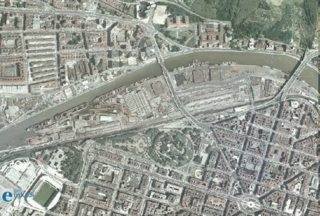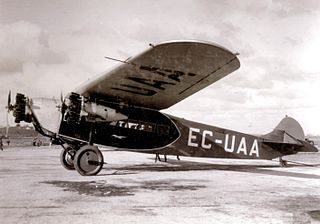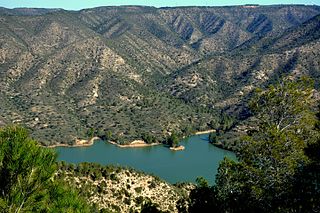
The State Company for Industrial Investments is a Spanish state-owned holding company that is characterized as a sovereign wealth fund. It is part of the Ministry of Finance.
Iberia, legally incorporated as Iberia Líneas Aéreas de España, S.A. Operadora, Sociedad Unipersonal, is the flag carrier of Spain. Founded in 1927 and based in Madrid, it operates an international network of services from its main base of Madrid–Barajas Airport. Iberia, with Iberia Regional and with Iberia Express, is a part of International Airlines Group. In addition to transporting passengers and freight, Iberia Group carries out related activities, such as aircraft maintenance, handling in airports, IT systems and in-flight catering. Iberia Group airlines fly to over 109 destinations in 39 countries, and a further 90 destinations through code-sharing agreements with other airlines.

The Spanish miracle refers to a period of exceptionally rapid development and growth across all major areas of economic activity in Spain during the latter part of the Francoist regime, 1959 to 1974, in which GDP averaged a 6.5 percent growth rate per year, and was itself part of a much longer period of an above average GDP growth rate from 1951 to 2007. The economic boom came to an end with the 1970s international oil and stagflation crises that disrupted the industrialised world although several scholars have argued that "liabilities accumulated during years of frenzied pursuit of economic development" were in fact to blame for the slow economic growth of the late 1970s.
Navantia is a Spanish state-owned shipbuilding dedicated to civil and military naval construction, the design of deep-tech systems and the manufacture of structures for the renewable energy sector, such as offshore wind or hydrogen.

Ence Energía y Celulosa, S.A. simply known as Ence, is a Spanish multinational company that develops and supplies technologies, automation systems and services for the pulp, paper and energy industries.
Red Eléctrica de España is a partly state-owned and public limited Spanish corporation which operates the national electricity grid in Spain, where it operates the national power transmission system. It also holds assets in Peru, Chile and Brazil.

Transeuropa was a charter airline from Spain that operated from 1965 until 1982.

Compañía Transatlántica Española, S.A., also known as the Spanish Line in English, was a passenger ocean line that has largely ceased operations although it still exists as a company. It is popularly known as "La Trasatlántica" in the Spanish language.

In 2023, Spain produced 2.45 million cars which makes it the 8th largest automobile producer country in the world and the 2nd largest car manufacturer in Europe after Germany, a position it maintained in 2024.
The Compañía Sevillana de Electricidad, S. A. was a Spanish electricity generation company, founded in Seville in 1894. In the course of the 20th century it absorbed various other companies and came to be practically the sole generator of power in Andalusia. Beginning in 1996, it underwent the first of several stages in the process of being merged into the multinational corporation Endesa, becoming known as Sevillana-Endesa. That process was completed in 2002.

Euskalduna de Construcción y Reparación de Buques de Bilbao was a Basque engineering company specialising in ship construction, firearms, locomotives, and automobiles. The company was based in Bilbao, Spain and operated from 1900 until closure in 1984.
Renault España Sociedad Anónima, also known by its acronym RESA, is one of the largest manufacturing subsidiaries of Renault. The Spain-based company has facilities in Valladolid, Palencia and Sevilla, with most administrative offices in Madrid. Renault sells its cars locally through the subsidiary RECSA. The company emerged from the local automaker FASA, which had assembled Renault cars since 1953.

Compañía de Líneas Aéreas Subvencionadas, meaning 'Subsidized Airlines Company', mostly known as CLASSA, was a Spanish airline based in Madrid, Spain.

Juan Antonio Suanzes Fernández was a Spanish naval engineer. Before the Spanish Civil War (1936–1939) he directed a shipyard. During the civil war he offered his services to the Nationalist side, and was made Minister of Industry and Commerce from 1938 to 1939. He was again Minister of Industry and Commerce from 1945 to 1951.

Mequinenza Dam is a concrete gravity dam in the province of Zaragoza, Spain. It impounds the Ebro creating a large reservoir, which is called Mar de Aragón. About 35 km downstream of Mequinenza dam is Ribarroja dam.

Ribarroja Dam is a concrete gravity dam located in the province of Tarragona, Spain, that impounds the Ebro. About 35 km upstream of Ribarroja dam is Mequinenza dam. About 15 km downstream is Flix dam.

Altos Hornos del Mediterráneo S.A. (AHM) was a Spanish ferrous metallurgy company incorporated in 1971 to operate the integral ferrous metallurgy in Sagunto, known as the 4th Integral Ferrous Metallurgy Plant of Spain. At the time of its creation, it inherited the historical facilities that Altos Hornos de Vizcaya had owned in Sagunto since the beginning of the 20th century. However, the company's activity was strongly affected by the industrial crisis that the country experienced in the 70's and 80's, so that in 1984 the public administration agreed to cease its operations.

Sociedad Minera y Metalúrgica de Peñarroya, usually abbreviated as SMMP, was a French-owned multinational mining company that operated between 1881 and 1989. During its existence it had an important presence in Spain.
Sociedad Española de Construcciones Electromecánicas, colloquially known as "electro", was a Spanish company in the non-ferrous metals industry that operated between 1917 and 1978. Throughout its existence it was one of the most important Spanish companies in the copper sector, having its main activity in Córdoba. Among its products were copper products, brass, electrical transformers, etc.













